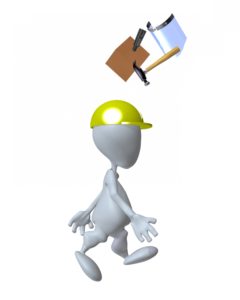Around 10% of all fatal and non-fatal accidents in the workplace are caused by being struck or hit by a moving object, including falling projectiles .
Whether it an item falling from shelving/racking, a tool falling from  scaffolding on a construction site, or haybales collapsing onto a farm worker, the risk of falling objects is common across many industries and must be managed accordingly.
scaffolding on a construction site, or haybales collapsing onto a farm worker, the risk of falling objects is common across many industries and must be managed accordingly.
Forklift driver narrowly escaped death when racking collapses
In November 2017, fire crews spent four hours rescuing a 54-year-old man who had been buried after six layers of racking collapsed on to him; bringing down between 10 and 11 bales loaded with milkshake, milk, and energy drink products, each weighing a tonne. The incident was handled in the manner of an earthquake recovery as the man was not visible under the mass of drink products, but rescuers were able to establish verbal communication by using strategically placed microphones. Thankfully the man was not seriously injured, but it was clear the outcome could have been far graver, with the Watch Commander who oversaw the rescue stating the man “could easily have been killed” .
Earlier in 2017, 27-year-old Kevin Wright tragically died in similar circumstances. Mr Wright was handling bales of carpet, one of which fell on him, causing fatal crushing injuries. Following an investigation, the Health and Safety Executive (HSE) stated Mr Wright’s employer, Fresco Environmental Limited in Widnes, “failed to ensure” effective controls were in place for the stacking of bales, and additionally the piles of carpets were close to vibrating machinery which increased the risk of collapse. The company was fined £70,000 for their negligent actions.
No lack of safety information to prevent falling objects in the work environment
It would be too easy to explain these accidents away as bad luck, or just being in the wrong place at the wrong time. There is an abundance of industry-specific guidance available to employers to ensure such as incidents never happen, including in warehousing, agriculture, and timber yards; so why do accidents still happen?
Falling objects kill, and employers have a duty to ensure workers are safe from such eventualities. In practical terms, many fatal and non-fatal accidents due to falling objects are due to a lack of proper risk assessment and control by employers. All employers must complete the following five steps on a continuous basis :
- Step 1: identify the hazards;
- Step 2: decide who might be harmed and how;
- Step 3: evaluate the risks and decide on precautions;
- Step 4: record your findings and implement them; and
- Step 5: review your risk assessment and update if necessary
Therefore, if your employer has failed to carry out one of these steps at any stage, and an accident results, their actions would be deemed negligent, and therefore compensation may be due to the injured party.
What safety measures can employers implement to ensure worker safety?
The Work at Height Regulations 2005 exist to ensure workplaces are safe from falling objects. There are many specific contexts in which falling objects can be prevented, or injuries avoided, including:
- Placing heavier items lower down on shelving/racking/roll cages – the very heaviest should be on the ground level.
- Using the correct forklift truck attachment to ensure loads are safe when being moved
- For overhead conveyor systems, using screening to avoid the potential for falling objects
- In construction sites, tethering devices can be used to stop tools falling
- Ensure loading of shelves adheres to maximum weights and optimal positioning
- Using hard hats to prevent head injuries if objects do fall
- Implementing restrictions around loading areas
- Providing regular training to all employers regarding stacking best practice and reducing falling object risks
- Give careful consideration to methods of stacking, handling, and movement of goods to prevent articles falling
- Make sure tall self-standing objects (e.g. gas cylinders) or objects leaning against walls are either stable if knocked or secured
- Provide clear warnings if there is a risk which cannot be fully removed
There are many more safety measures which can be considered by employers, and as such, there is no excuse for not identifying or controlling object fall risks.
Claiming in the event of a serious accident at work due to a falling object
As we have established, objects falling from height have the potential to kill or seriously injure. If this has happened to you, you may be been forced to take excessive time away from work to recover, or you may even be unable to return to work for the foreseeable future. You may be eligible compensation if it can be shown your employer was at fault in causing your accident. This money can go a long way to helping you cope with the aftermath of your accident, including covering your day to day bills, additional medical costs, or modifications to your home, in addition to compensating for the stress and pain you have endured.
At Russell Worth Solicitors we specialise in personal injury claims. If you have suffered a workplace injury and would like a free claim assessment, please call us now on 0800 028 2060 or complete our Online Claim Assessment.

